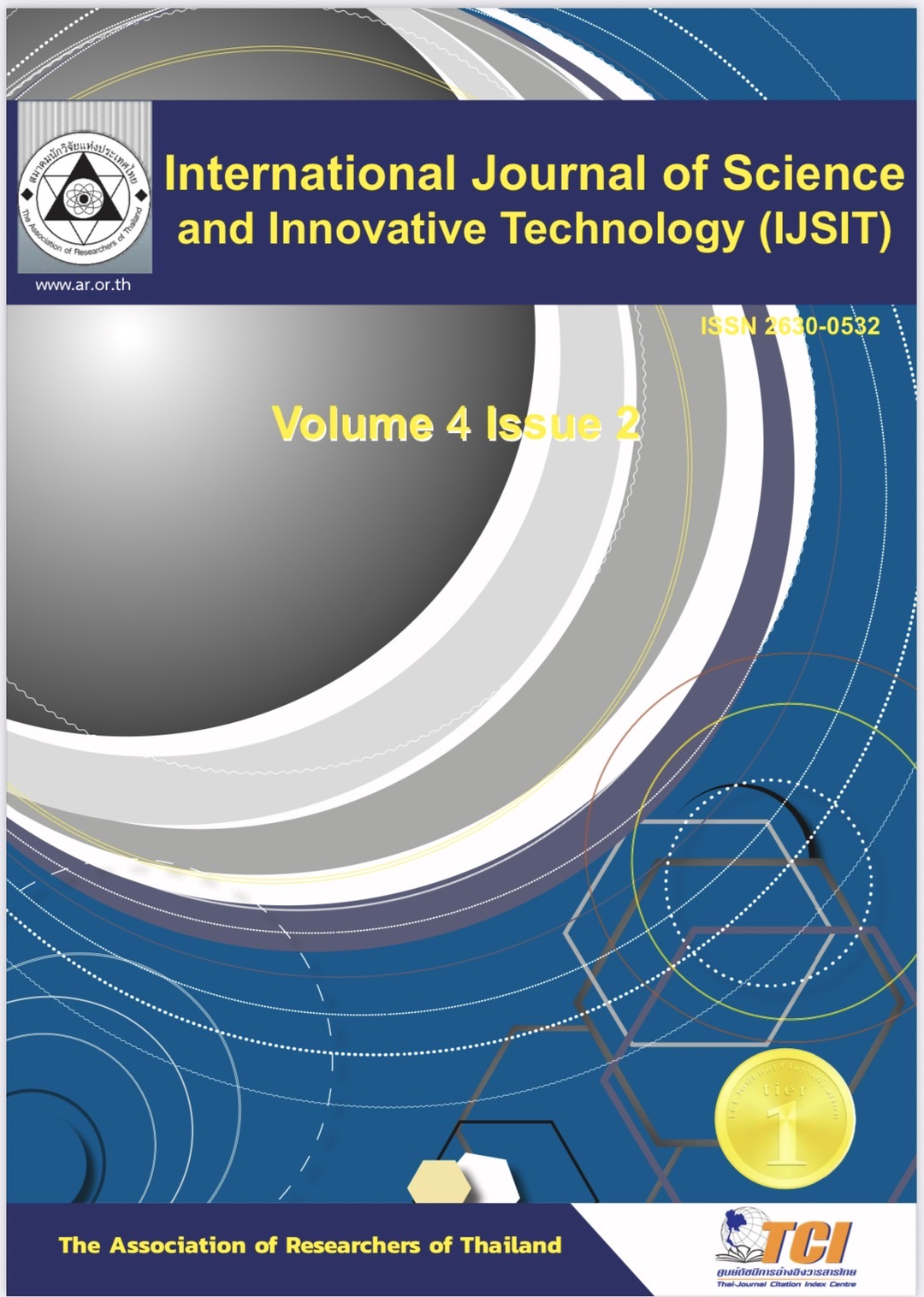Innovative Curriculum Development for Vocational Skill Enhancement and Learning Solution for Underprivileged Youths Using Community Learning Resources
Main Article Content
Abstract
This research on the curriculum development for vocational skill enhancement and learning solution for the underprivileged youths using community learning resources aims to
1) Study basic information regarding curriculum development 2) Design and develop the curriculum 3) Implement in using the curriculum 4) Evaluate the effectiveness of the curriculum 5) Expand the results in applying the curriculum. The target group in this research includes underprivileged youths in education. The tools used in the research consist of the curriculum of vocational skill development and solving of learning problems, the user manual, and the learning management unit. The data obtained are analyzed by examining the suitability of the curriculum and it is found that 1) results in studying fundamental information reveal that a career-focused curriculum should be developed 2) curriculum development results are of high quality and with an efficiency value of 82.40/92.39 3) results of the curriculum experiment revealed that the youths are capable of creative problem-solving. And the average value of professional characteristics is at a high level. 4) For the effectiveness of the curriculum with respect to course documents, manuals, and learning management units, all are appropriate and consistent with practical uses at the highest average level. As for learning outcomes, it is found that youth with educational unprivileged youths have skills in solving vocational learning problems at a high level. 5) As for the results of the curriculum expansion, in terms of learning outcomes, the youth have creative learning skills while vocational characteristics in the learning are found to be at a high level.
Article Details
References
Agricultural Cooperative Federation of Thailand Printing House Co., Ltd.
Kornwika Konkaew. (2016). The Format of the driving process for immunization of
underprivileged children under the changes of society: a case study of an NGO in
Bangkok. Thesis of the Applied Behavioral Science Research, Behavioral Science
Research Institute, Srinakharinwirot University.
Chaweewan Talsuk. (2015). Development of creative dance courses according to creative
education management guidelines. For primary school students. Thesis of Doctor of
Philosophy in Curriculum and Instruction Program, Graduate School, Silpakorn University.
Duenpenporn Chaiphakdee (2021). Curriculum development for the innovation in teaching
creative productivity based on learning resources of local herbs. Academic Journal of
Curriculum and Instruction, Sakon Nakhon Rajabhat University, Volume 13, No. 36, J
anuary - April 2021, pages 1-9
Duenpenporn Chaiphakdee (2021). Participation in enhancing careers of the elderly using the
wisdom in product processing of herbal fish food products. Journal of the Humanities
and Social Sciences, Surin Rajabhat University, 21st year, No. 1 (2019): January-June,
pages 295-308
Niwat Boonsom. (2015). Development of teaching and learning patterns based on the concept
of the creative problem-solving process to promote health innovations for scientifically
talented students. Silpakorn Educational Research Journal 7 (1):123.
Panya Thongnil. (2011). Development model in teaching competency by integrating the
intervention for teacher students to enhance desirable characteristics of learners.
Silpakorn Educational Research Journal 3(1):93.
Phimphan Techakupt. (2005). 5C Skills for Learning Unit Development and Integrated
Instructional Management. Chulalongkorn University Press. Bangkok
Maream Nillapun. (2012). the Curriculum Assessment of Master of Education Degree in
Curriculum and Instruction Program, Faculty of Education, Silpakorn University. Faculty
of Education, Silpakorn University 7 (2):25.
Maream Nillapun et al. (2015). Assessment of the use of the Basic Education Core Curriculum
B.E. 2551 in prototype schools using the curricula. Silpakorn Educational Research
Journal 11 (1):26.
Rujiraporn Ramsiri. (2015). The development of science teaching and learning research-based
models to promote research skills, creative problem-solving skills, and psychology of
secondary school students. Silpakorn Educational Research Journal 7(1):110.
Government Gazette. (2019). Vol. 136, Special Section 274. Page 32, November 8, 2019.
Wichai Wongyai. (2012). Developing a teacher development model in the changes of
curriculum to learning. Faculty of Education, Silpakorn University7(2):10.
Office of the National Economic and Social Development Council, Office of the Prime
Minister. (2017). the Twelfth National Economic and Social Development Plan (2017-
2021) Retrieved on June 15, 2019 at www.nesdb.go.th/ewt_news.php?nid=6420.
Sujarit Pianchob. (1990). the curriculum of characteristics and trends in the development.
Bangkok: Department of Secondary Education, Faculty of Education, Chulalongkorn
University
Sompong Jitradup (2019) Interview on the Area is the Answer to Education Reform:
https://www.knowledgefarm.in.th/ Retrieved on January 2, 2019).
Sumalee Sangsri. 2001. Research Report on Lifelong Education for Thai Society in the 21st
Century. 1st Edition. Office of the National Education Commission, Office of the Prime
Minister. Bangkok: Photocopied
Suwitida Jarungkiatkul. 2011. Lifelong Education and Lifelong Learning. Academic article on
Definitions, Concepts, Characteristics of Lifelong Education. Bangkok: Chulalongkorn
Press.
Achanya Rattanaubol. 2014. Lifelong Education and Lifelong Learning. Academic article on
Definitions, Concepts, Characteristics of Lifelong Education. Bangkok : Chulalongkorn
Press.
Armstrong. David G. (2003). Curriculum today. New Jersey :Merrill Prentice Hall. Isaken, S. G;
&Treffinger, D. J. (1991). Creative Learning and Problem Solving.
In Developing Minds: Program for Teaching Thinking. Costa Arthur: Alexandrial:
Supervision and Curriculum Development.
Torrance, E.P. (1986). Teaching Creative and the Gifted Learners. New York: Macmillan
Publishing Company.
Oliva, Peter F. (2013). Developing the curriculum. 8thed. Boston :Allyn and Bacon.
Osborn, A. F. (1963).Applied Imagination.(3rd ed). New York: Scribner’s.
Parnes, S. J., R. B.Noller, and A. Biondi.(1976).Guide to Creative Action. New York,
CharlesScribner’ s Sons. Cited in Davis, G. A. 1983. Creativity is Forever.
UnitedStateof America: Kendal/Hunt Publishing Company.
Posner, George J. (2004). Analyzing thecurriculum.Boston: McGraww Hill.
Wiles, Jon W. (2009). Leading curriculum development. 8thed. California: Corwin Press.
Wiles, Jon W. and Bondi, C. Joseph. (2011). Curriculum development a guide to
practice. 8thed. Boston :Pearson. Unicef for every child Thailand
https://www.unicef.org/thailand/ Retrieved on 30 June 2018).


